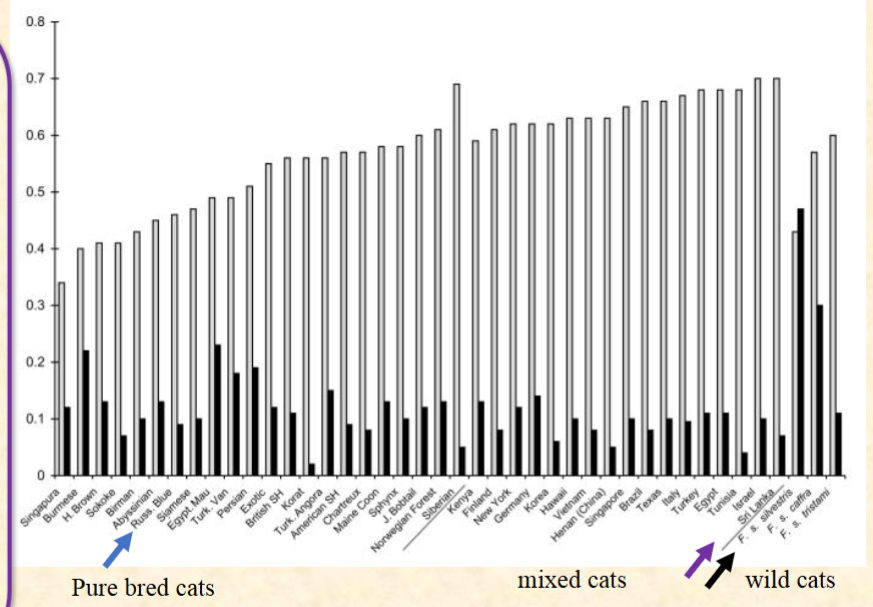Lec 5 - Measuring Allele frequencies to Hardy-Weinberg
1/6
There's no tags or description
Looks like no tags are added yet.
Name | Mastery | Learn | Test | Matching | Spaced | Call with Kai |
|---|
No analytics yet
Send a link to your students to track their progress
7 Terms

C. Sri Lankan strays (purple)
Grey bars are heterozygosity
(measured at intergenic DNA)
Black bars are inbreeding
coefficient (higher number
means more inbreeding). Which
cats do you predict would have
the largest gene pool?
Pure bred cats mixed cats wild cats
A. Wild Felis syvestris (black)
B. Russian Blue cats (blue)
C. Sri Lankan strays (purple)
D. All about the same
E. All of the wild cats would be
larger than the domesticated
cats
C. 70
This shows ALDH (acetaldehyde dehydrogenase) genotype and allele frequencies in a study
group of 100 males, half with alcoholism and half matched healthy controls.
Thomasson et al Am J. Hum Genetics 1991
What percentage of the total alleles in the non-alcoholics is represented by the
ALDH-Q allele?
A. 52
B. 36
C. 70
D. 88
E. 30

D. III
This shows ALDH (acetaldehyde dehydrogenase) genotype and allele frequencies in a
study group of 100 males, half with alcoholism and half matched healthy controls. From
these data you can conclude.
Thomasson et al Am J. Hum Genetics 1991
I. ALDHQ is dominant to ALDHS because there are more ALDHQ alleles
II. ALDHQ is dominant because it breaks down acetaldehyde more slowly
III.Alcoholics are less likely to have the ALDHS allele
IV. It is likely that the ALDHS allele will disappear from the population.
A. I, III, IV
B. II, III, IV
C. III, IV
D. III
E. I, III

C. 0.375
A population of
butterflies has the
following genotype
frequencies: 0.45 AA,
0.35 Aa, and 0.2 aa.
What is the frequency of
the “a” allele?
A. 0.55
B. 0.2
C. 0.375
D. 0.625
E. 0.5
0.22
A scientist has studied the amount of polymorphism in the alleles controlling the enzyme Lactate
Dehydrogenase (LDH) in a species of minnow. From one population, 1000 individuals were
sampled. The scientist found the following frequencies of genotypes: AA = 0.08, Aa = 0.28;
aa = 0.64. From these data calculate the allele frequency of the "A" allele in this population.
0.35
You have a population of winged lemurs. There is a gene
that controls the number of rings on their tails. There are two
alleles M and F. MM gives lots of rings, MF gives an
intermediate number and FF gives just a few. The genotype
frequencies are
MM: 0.5
MF: 0.3
FF: 0.2
What is the allele frequency for F?
C. You can’t tell, but if there is selection for one of
the phenotypes the genotype that gives rise to it
will likely become more common.
Eastern gray squirrels occur in three variants.
Gray, gray/black and black. This is due to varied
expression of a single gene – the allelic variation
is in the promoter. (little expression=gray, lots of
expression=black). The black allele is currently
rare. Heterozygotes have an intermediate
phenotype. Will black squirrels eventually
disappear or become more common?
A. They will likely disappear because the black allele
is rare.
B. They will become more common because the
black allele is dominant.
C. You can’t tell, but if there is selection for one of
the phenotypes the genotype that gives rise to it
will likely become more common.
D. Flying squirrels are cooler, so they will dominate.